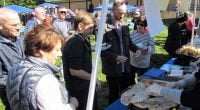Teaching Peace in Schools

Date posted: September 26, 2012
Alp Aslandogan, President, Alliance for Shared Values*
This week New York City hosts the United Nations General Assembly, the Clinton Global Initiative and the Education Nation conference. These massive events focus on international diplomacy and peace, societal problem-solving and improving classroom instruction. However, just a few blocks away from these grand assemblies, a smaller group met for the first time to tackle all these issues with a single, bold strategy.
Monday, an international group of educators and convened for the inaugural “Peacebuilding Through Education” summit sponsored by Fountain Magazine, the Peace Islands Institute and co-sponsored by regional universities as well as the Alliance for Shared Values, where I serve as president. The goal of the summit was to show how lessons of tolerance, understanding and intercultural respect can be woven into classroom curriculum or extracurricular activities. Throughout the day, speakers offered insights and strategies for building character in the classroom and creating a safe learning environment to incubate future leaders of more peaceful communities.
The first panel, featuring Ministers of Education from both the Philippines and Tanzania, focused on government’s involvement in creating an environment for peace education. Later, I was fortunate to join a panel with fellow academics from Ireland and South Africa to discuss strategies for mobilizing civil society to achieve peace. Fellow academics from Ireland and South Africa spoke of peace education in an increasingly connected world. Another diverse panel including experts from UNICEF, Arigatou International and Fatih University in Turkey discussed the notion of peace as a shared ideal that can be reinforced through education.
During my remarks, I spoke of how a “committed core” of individuals taking bold steps can help spark action among stakeholders who may be reluctant to take important steps for fear of violent reprisal. In unstable regions, warlords and terror groups recruit from the most vulnerable segments and build their ranks with those who have lost hope. A committed core of teachers, parents and community leaders with the courage to lay down their lives for these students has, in many cases, meant the difference between building a stronger community or surrendering to violent intimidators.
These committed heroes are making real impacts throughout the world. At a school in Southeast Turkey, Kurdish children are receiving free tutoring to prepare for schools of medicine, law and engineering, which has created opportunity for those who might otherwise be drafted into the PKK terrorist group. A specialized school in Zamboanga, the Philippines, is bringing Christian and Muslim students together to live and learn under the same roof, which has contributed to greater unity and communication between groups in the village. Another school has brought Serbian, Bosnian and Croatian students together, which has led to friendships instead of the animosity that often festers between these communities.
Throughout the day, organizations were honored with best practice awards for their efforts to use instill the importance of peace in our children. The Filipino-Turkish Tolerance School, Search for a Common Ground, and Plural+, a youth video contest created by the United Nations Alliance of Civilizations, were all recognized for their innovative approaches to bridging cultural gaps between communities to prevent conflict and encourage social change. The day concluded with a ceremony announcing the contest winners of an international photo contest called “Peace In a Frame,” which challenged photographers around the world to capture and submit photos representing peace. The inspired artists and winners of this inaugural contest can be seen in the accompanying slideshow.
The events this week at the U.N. General Assembly, Clinton Global Initiative and Education Nation will hopefully yield grand commitments and outcomes that will help us achieve a more stable peace throughout the world. In the meantime, it is essential at the grassroots level that the committed core of courageous teachers, parents and community leaders remain dedicated to teaching our children the importance of character and respect so that they grow to lead more peaceful nations in the future.
Source: The Huffington Post, September 26, 2012
* Dr. Aslandogan is the President of the Alliance for Shared Values, a new non-profit organization that convenes interfaith and intercultural dialogue organizations for the purpose of advancing human understanding of living in peace and harmony.
Tags: North America | Peacebuilding | USA |
























